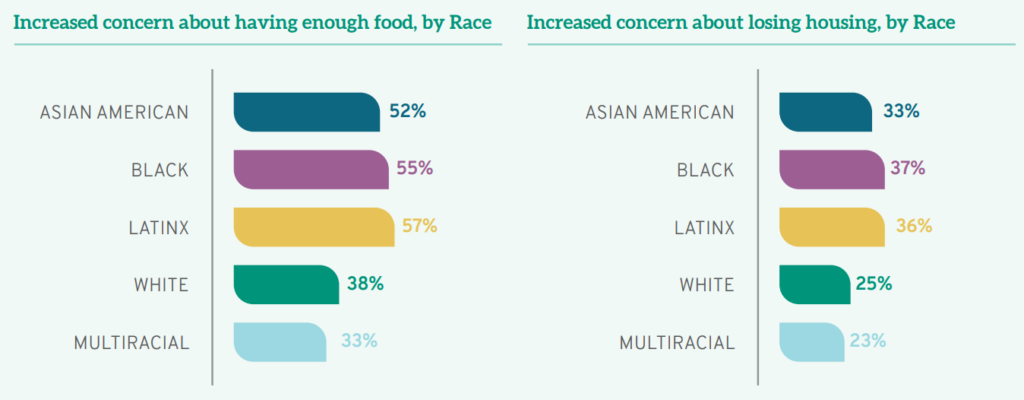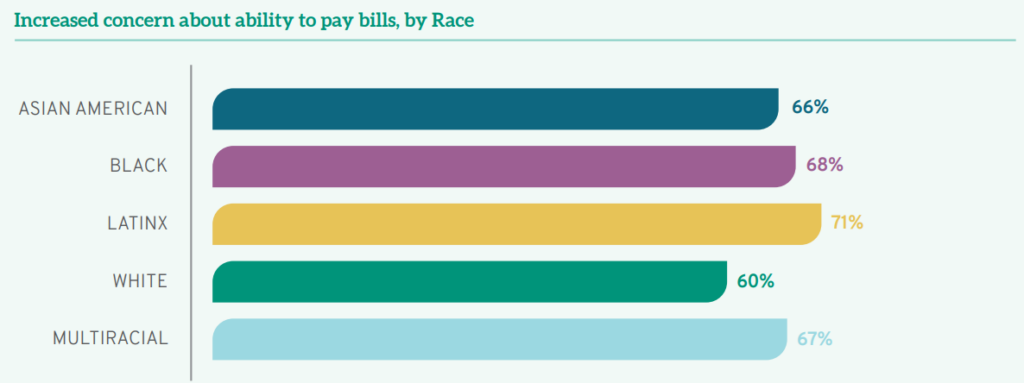In our last post, we used LSSSE longitudinal data that was first reported in our 2021 Annuals Results, The COVID Crisis in Legal Education (pdf), to discuss the areas of law student engagement that were most impacted by the COVID-related challenges of the 2020-2021 academic year. In addition to the intangible losses, COVID also deepened ongoing disparities and inequities in legal education, as it did in society more generally. Student populations that were especially vulnerable pre-pandemic faced even greater challenges over the past year. The crisis has been perhaps most critical when considering basic necessities, though every level of Maslow’s hierarchy of needs has been affected—from the essentials of food, rest, physical safety, and financial security to the desire for belonging, appreciation, and ultimately achieving one’s full potential.
In 2021, many students struggled to meet their basic needs. In their responses to the LSSSE survey module Coping with COVID, 43% of all law students reported increased concern about having enough food due to COVID-19. This already troubling finding about students as a whole masks significant racial disparities with food insecurity: over half of all Black (55%), Latinx (57%), and Asian American (52%) students acknowledged that the past year brought increased concerns about whether they had enough food to eat.

Financial concerns weighed heavily on students’ minds. Almost two-thirds (63%) of all student respondents had increased concerns about their ability to pay their bills, with both gender and race-based disparities increasing challenges for already vulnerable populations. For instance, among those who had elevated concerns about their financial security were 71% of Latinx students, 68% of Black students, 67% of multiracial students, and 64% of Asian Americans, compared to 60% of White students. Additionally, while over half of the men (57%) worried that the pandemic would affect their ability to pay their bills, over two-thirds of the women respondents (67%) faced similar financial uncertainty; a full 14% of women students reported that their financial fears had increased “very much,” compared to only 6% of men reporting that same high level of concern.

Perhaps unsurprisingly, given elevated attention to satisfying basic needs like food, shelter, and financial security, as well as the realities of the pandemic, 75% of all law student respondents also reported increased concerns about their own health and safety, while 84% were also more worried about the health and safety of friends or family. A full 75% reported a decline in their own physical health over the past year, though men fared better in this regard: two-thirds (69%) of all men surveyed noted a decline in their physical health compared to over three-quarters (78%) of women law students.

Legal education has survived what were hopefully the deepest lows of the COVID-19 pandemic. But we did not emerge unscathed. The core of legal education continued as before—the basics of teaching and learning pivoted from in-person to online, professors successfully conveyed care and concern along with doctrinal analyses, and student satisfaction levels remained remarkably high. Yet just as in other aspects of our lives this past year, legal education lost much of its depth and flavor. It has been less fulfilling, less comprehensive, less effective at imparting the intangible skills our students will need to employ in their future careers. Most critically, the Coping with COVID Report (pdf) reveals that our students have been struggling beyond anything they have experienced collectively before.
